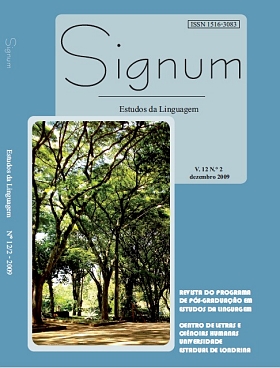Ungrammaticalization of {-inho}
DOI:
https://doi.org/10.5433/2237-4876.2009v12n2p205Keywords:
Ungrammaticalization, Linguistic change, Brazilian Portuguese.Abstract
This paper addresses the process of change in which the {-inho} affix becomes a free form, which sometimes works as an adjective or as a noun. We consider this process as a phenomenon of ungrammaticalization. In fact, if we observe the route of this process, we can see that the variant "-inho", which etymologically comes from the flexional suffix {-inu} in Latin, acquired phonological strengthening with the addition of the segment [z] to its base, and it resemantized into "zinho" which, in some contexts, took the form and function of a name, meaning "individual", "person". This can be summarized as follows: (-inu) > -inho > -zinho > zinho > adj. > subst.
Downloads
Downloads
Published
How to Cite
Issue
Section
License
Copyright (c) 2025 Alcides Fernandes de Lima

This work is licensed under a Creative Commons Attribution-NonCommercial-NoDerivatives 4.0 International License.
This journal reserves the right to make, in the originals, normative, orthographic and grammatical modifications in order to maintain the standard language and the credibility of the publication. It will respect, however, the authors' style of writing. Modifications, corrections and suggestions of conceptual order will be forwarded to the authors, if necessary. In these cases, the papers, once appropriate, should be submitted to a new appreciation. The final examinations will not be forwarded to the authors. Works published become property of Signum, being its total or partial reprint subject to an explicit authorization of the journal. In all subsequent quotes the original source of publication should be mentioned, in case, in Photographic Discourse. Opinions emitted by the authors are their exclusive responsibility.
















